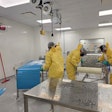The loving nature of dogs combined with their tail-wagging friendliness have earned them an endeared reputation as our best friend. Research scientists and veterinarians shared insights about how their work is helping to advance the lives of dogs at the AKC Canine Health Foundation National Parent Club Canine Health Conference, held Aug. 9 to 11 in St. Louis. Their studies of canine epilepsy, cancer, tick-borne diseases, and anxiety-related behavioral problems – research funded in part by Purina – may one day provide cures or help owners treat debilitating conditions that potentially could shorten the lives of their beloved pets.
Attended by nearly 300 dog lovers and enthusiasts, the 12th biennial conference included breed parent club representatives, veterinarians, veterinary students and residents, and canine health researchers. The lead sponsor since 1997 of this educational forum for canine health discoveries, Purina has invested more than $14 million to support research funded by the AKC Canine Health Foundation. This includes a record donation of nearly $1 million presented last February to the Foundation and breed parent clubs from the 2018 Purina Parent Club Partnership Program. As the largest funder in the world of health research exclusively for dogs, the AKC Canine Health Foundation currently manages an active research grants portfolio of almost $10 million for 128 research studies addressing top health concerns in dogs.
"Purina is our partner in helping to educate dog owners about canine diseases and increase awareness that comes from our funded research studies. We have a rich history together that has resulted in benefits to dogs and their owners through better diagnoses, treatments and outcomes for canine health," said Diane Brown, DVM, PhD, CEO of the AKC Canine Health Foundation.
Purina support of research has brought many findings, including the following cited by Dr. Brown:
- The discovery of the DNM1 gene mutation causing exercise-induced collapse (EIC) in Labrador Retrievers, a condition in which young dogs become weak and collapse after strenuous exercise. A direct DNA test for EIC allows breeders to reduce disease incidence through breeding management. Meanwhile, more work is underway to identify the mutation in other breeds.
- Better understanding of cranial cruciate ligament (CCL) disease, the No. 1 cause of lameness in dogs, through the development of a conformation score that determines a dog's risk for CCL injury and 3-D computer models that evaluate the biomechanics of the stifle, or knee, and different surgical procedures to determine their effectiveness.
- Insights about genetics, nutrition and alternative therapies for treating canine epilepsy, the most commonly diagnosed chronic neurological disorder in dogs.
"We are proud to be the charter sponsor of this important canine health conference," said Purina Director of Conformation Ann Viklund, a member of the board of directors of the AKC Canine Health Foundation. "The strength of this partnership lies in our shared passion and commitment to support research that will help dogs live long, healthy lives. At Purina, our vision is to advance the lives of pets, and by sponsoring this conference, our goal is to create an environment that allows breed parent club representatives and other key influencers to learn information they can disseminate broadly to the dog-owning public."
Key takeaways presented by canine experts at the conference included:
- Recent cancer studies are investigating the potential for the body's immune system to be activated using new immune therapies to control or eliminate tumors such as bone cancer, lymphoma and brain cancer.
- Vector-borne diseases caused by ticks, sandflies, mites, mosquitoes, and other arthropods can look identical and potentially cause immune-mediated disease in which the body's immune system attacks healthy cells. Dogs suspected of immune-mediated disease should have a comprehensive screening to ensure a proper diagnosis and treatment.
- Research of hot spots across North American for leptospirosis, an emerging, potentially fatal zoonotic disease spread between animals and people via contact with urine from infected animals, aims to increase awareness and reduce the risk of disease.
- Anxious behaviors in dogs reacting to novel noises, unfamiliar visitors or separation may be aided by Purina® Pro Plan® Veterinary Supplements Calming Care, introduced in January 2019, which contains a probiotic strain of beneficial bacteria called BL999 shown to help dogs stay calm.
"This is such a wonderful conference to learn about progress treating inherited diseases and canine health disorders. I am always impressed by the excitement generated by the discussions and the presentations," said Anita M. Oberbauer, PhD, professor at the University of California-Davis, who presented a talk on autoimmunity and endocrine disorders. Dr. Oberbauer received the Asa Mays, DVM, Excellence in Canine Health Research Award, which was presented at the conference by representatives of the Foundation.
Helping our best friends spend more healthy time with their owners is the aim of Purina and the AKC Canine Health Foundation. "I urge dog owners to help advance the lives of dogs and those who love them by becoming a member of the AKC Canine Health Foundation," Dr. Brown said. "Dog owners can log into akcchf.org/membership to join the Foundation. Together with Purina we can all help dogs live long, healthy lives."














